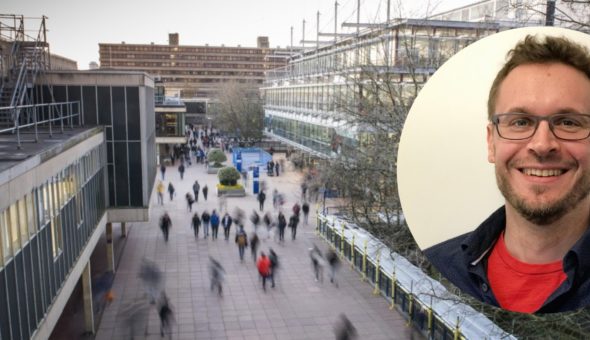Rob Middleton (BSc Economics w Econometrics 1994) is Executive Director of Fidelity International Asset Management.
He talks here about why he supports CR@B, the importance of their work and why, if you can, you should support them too.
Rob Middleton
What is your link to the University of Bath?
It’s my old stamping ground. I spent five happy years living in Bath, three of them studying at the University and two of them commuting to work in Bristol. I read Economics with Econometrics, graduating in 1994, which seems like yesterday in my memory but my calendar assures me otherwise! Since moving to work in London I have been involved with campus recruitment activities for a previous employer (JP Morgan Investment Bank) and my current employer (Fidelity International Asset Management).
How did you find out about CR@B?
As I recall, I think I originally read about the University’s programme of cancer research in an alumni newsletter of some sort, many years ago. I think it then came up in conversation with a member of University development staff over a keeping-in-touch cup of coffee.
How long have you been involved?
I have been contributing to the University for many years, but have been steering my contributions towards the CR@B work for the last three or four years.
What made you decide to support them?
I was diagnosed with bone cancer a few years ago and embarked on a six year journey of fear and discomfort involving prolonged in-patient chemotherapy, intrusive surgery and phased reconstruction. Thankfully, five years have now passed without incident or recurrence and normal life has resumed. Others that shared my predicament were not so fortunate, either because their diagnosis was less swift or the treatment less effective. During the harrowing period of initial discovery, I remember being alarmed and disturbed at the imprecision of the imaging techniques available to support diagnosis or assess progress. Chemotherapy treatments were worryingly indiscriminate and assertions about their effectiveness seemed largely based on crude ‘outcome’ statistics.
How important is the work of CR@B?
We may well look back in 20 years and be horrified at the way we treated cancers in the early part of this century. In fact, the extent of this horror should be a measure of the progress I hope we will have made in the intervening years. The more we invest to improve imaging, diagnosis, treatment etc. the more stark the historical contrast will become.
What would you say to any who may be considering offering their support?
We are all likely to be touched by cancer at some point in our lives, either personally or through the suffering of a close relative or friend. Charitable giving is a vital source of funding helping to accelerate the medical breakthroughs that I hope and expect to see in my lifetime. I am proud to support this important work and would encourage others to do the same.
If you would like to support CR@B, please visit lookfurther.bath.ac.uk/make-a-gift
Respond

